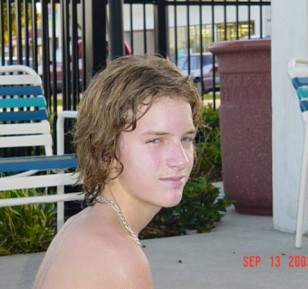I hope everyone had a great Thanksgiving yesterday! We sure did, and Erik was there enjoying the meal and company with us. It would have been nice to have had him in the flesh eating Mama’s home cooking, (and to help with the cleanup!) but I’m grateful for the Thanksgivings I did have with him.
Right now, we’re taking Bella, the new puppy, Scout, and Annika and Lukas on an RV trip. It’s at some little RV resort that’s only 20 minutes away, so I don’t think it counts as a real journey, but Scout needs to get used to being on the go with the fam.
As promised, here’s Part Two of the post about heart disease. Enjoy!
Me: Why do men tend to get more coronary disease?
Erik: Cuz they’re stupid.
Jamie laughs.
Me: People think of woman being the ones who give away their resources and deny themselves more.
Erik: That’s true, but they’ll take care of their physical bodies more. They have a sense of balance. We have a lot of men who give so much to their career and not to their wives, kids, home and themselves. And they eat poorly, so, you know, fast track, my friend, to a heart attack!
Me: I know. A Big Mac attack will lead to a heart attack.
Jamie laughs.
Me: What about energy healing? Would that help?
Erik: Yes, by moving away the densities, but it’s not going to cure it because it’s not taking care of the actions that create all that compacted energy in the chest. But yes, it’d give you the time to process things and the opportunity to see how it feels to have that lightness and joy in the chest instead of the belt.
Me: Women get less coronary disease, but they have a higher frequency of death. Why?
Erik: Cuz they’re in it to win it, Mom.
Jamie laughs.
Me: What?
Erik: Man, if they’re going to have that heart attack, they’re going to go all the way.
Me: Why?
Erik: Cuz you women are crazy.
I gasp in mock horror.
Erik: It’s more about a personal lesson. A lot of times, we see women as being very flexible and understanding, but obviously if it goes too far and they survive—we’re speaking in general—
Me: Okay.
Erik: When women go through experiences like this, they’d rather go away because they’re usually the caretaker and provide for others, so if they come back being a half a person or if they don’t have the same quality of life, they’re more apt to choose, “Let’s just let this go. There’s so much damage here. I’m not going to have that life.”
Me: Yeah. Interesting.
Jamie: That is interesting.
Me: Two more types of heart disease, and I just want to know if there are any differences with these two, spiritually. One is congestive heart failure. The heart just doesn’t work as well as a pump anymore.
Erik: Are we comparing it to another one?
Me: Nah, I mean, is there something special about that compared to what we’ve been talking about? Does it have some other spiritual basis in addition?
Erik: No, we’re just talking in general. They’re all going to be based on emotions and awareness of one’s emotions. The heart attack one seems to be more focused on like a sneak attack. Congestive heart failure, you feel. It’s kind of long term. It doesn’t usually happen overnight. You have a hard time breathing. You’re very aware of how you’re treating yourself, but you’re not changing to get it done, so your body is highlighting what you already know. The heart attack is behind the scenes kind of what your head is doing to your heart as well.
Me: Okay. What about arrhythmias?
Erik: You’re usually born with it.
Me: Okay. Not always, but a lot of times, yeah.
Erik: Usually.
Me: So how can that be about self-love if you’re born with it? You haven’t even had a chance to deny yourself.
Erik: We talked about that. That was the ancestral hand-me-down kind of wrapped around a lesson in the family or the other life.
Me: Is there ever a time that it’s not passed down? Somebody comes in with a congenital arrhythmia through a spontaneous mutation?
Erik: You like mutations, don’t you?
I laugh. I have no idea what he means, though.
Erik: Yes, it happens, but it’s not as common. So the purpose in asking the question is to know what it’s related to, energetically?
Me: Yeah.
(Long pause)
Jamie (To Erik): Wait. Are you being serious or are you joking?
(Pause)
Jamie: He was doing a side note on the nutation part.
Erik: When we see humans that have some mutations in the cells and so forth, this is commonly, not 100%, but commonly the soul and energy in the person has connections to many multidimensional beings.
Me: Oh! Interesting!
Erik: Usually, that mutation is not a human fault. It’s a human plus.
Me: Oh, okay.
Jamie: He was just ranting on the side, but I thought it was interesting. You know, what’s interesting is he can say something so intense in 4 seconds, and it’s going to take me 3 minutes to explain.
I chuckle.
Erik: But with your—
Jamie: What’s it called?
Me: Arrhythmia?
Jamie: Arrhythmia.
Erik: That’s more coming on as: it can be medicated. It can be repaired. It can be lived with. It’s more of a game-changer rather than an end of game changer because when a person develops this, it’s a knock on the door going, “Hey, the way you’ve chosen to live your life now needs to change. You need to look at where you’re living, what you’re doing and change your lifestyle. You do so and you survive.
Me: Yay!
Jamie laughs.
Erik: It’s more like a warning.
Me: All right. Anything else on heart disease?
Erik: No.
Me: All right. That’s a wrap then! Thank you, guys. Thank you, Jamie. Thank you, Erik.
Erik: It’s a wrap!
Me: Until next time, people.


